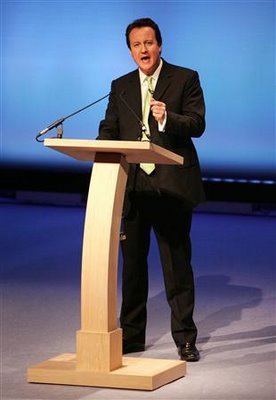Sunday, October 01, 2006
Don't Kid yourself Dave- you still have a Mountain to Climb
 I watched David Cameron being grilled by Andrew Marr this morning and was impressed by how he has grown into his leadership role in the nine months since he was elected. He seems to have gripped the party machine and routed his opponents on the right like Tebbit, Melanie Philips and the Daily Telegraph. Andrew Rawnsley today suggests Labour's failure to resolve its leadership impasse at Manchester leaves the field clear for the Etonian to excell this coming week at Bournemouth. Michael Portillo, seems to agree, suggest he has only to make a passable speech, sit tight and let Labour's infighting continue its self destruction. But these judgement should not lead one to assume it will be easy, either to emerge with a triumph this week or to open the door to 10 Downing St.
I watched David Cameron being grilled by Andrew Marr this morning and was impressed by how he has grown into his leadership role in the nine months since he was elected. He seems to have gripped the party machine and routed his opponents on the right like Tebbit, Melanie Philips and the Daily Telegraph. Andrew Rawnsley today suggests Labour's failure to resolve its leadership impasse at Manchester leaves the field clear for the Etonian to excell this coming week at Bournemouth. Michael Portillo, seems to agree, suggest he has only to make a passable speech, sit tight and let Labour's infighting continue its self destruction. But these judgement should not lead one to assume it will be easy, either to emerge with a triumph this week or to open the door to 10 Downing St. 1. Writing yesterday Martin Kettle summoned up Karl Rove's assessment of the questions voters ask at election times: Is he a strong leader? Can I trust him? Does he care about people like me? Kettle concluded that:
a) Cameron has won his inner party battles but there have been no really big ones- like Blair's Clause Four victory over Labour's institutional opposition-to prove the point conclusively.
b) Cameron appears trustworthy but so did Blair at first; it would only need public revelation of involvement in, say, suppressing evidence connected with the peers for loans affair, for all the public's prejudices about politicians to crowd in and sully his trustworthiness in a trice.
c) Cameron has little need to convince Middle England that he cares about people like them- but the north and other peripheral areas? Doubtful. And Cameron's silver spoon provenance will be exploited by Labour, especially when his closest side-kick and soul-mate in politics is posh St Paul's educated George Osborne, profiled yesterday on radio four. Kettle concludes the questions in Dave's case would be answered respectively with: 'don't know, perhaps and maybe' while for Brown they would be probably be: 'yes, not sure and probably'.
2. It has been fine for Dave to brush aside calls for policy detail with the point that he is intent still on changing his party. True, but soon his policy teams are going to report and there could be problems with some of them in very quick time. For example the man heading his policy review, Oliver Letwin, has said there will be 'no limit' to the privatising of the NHS under a Conservative government. Ever since 1948 when the service was founded it has been seen as the ark of the welfare state's covenant and any reform has required extreme political delicacy. Similar things will happen when other groups come up with proposals for tax cuts.
3. Brown may be boring, Scottish and relentless, but he is no slouch politically and could well inflict considerable damage on the still inexperienced Cameron and his public school cronies.
4. Even though the government has had an appalling summer characterized by scandals(Prezza and loans for peerages)and bloody political infighting not to mention ongoing tragedies in Iraq and Afghanistan, Labour, no doubt helped by its conference 'bounce' can still manage to be level pegging with the Conservatives in the polls, according to yesterday's Telegraph.
Comments:
<< Home
Oddly, Skipper, I found Cameron on AM singularly unimpressive. He seemed just that little bit too eager to please; he was terribly repetitive (how many times did he chant his admans jingle "stability must come first"?), and above all the charge of "style not substance" clearly stings.
P-holic
These things are relative; I thought he seemed slightly more authoritative and obviously the 'leader', but I agree he was a bit repetitively banal.
Post a Comment
These things are relative; I thought he seemed slightly more authoritative and obviously the 'leader', but I agree he was a bit repetitively banal.
<< Home




